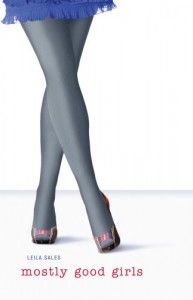I’m not going to give a plot synopsis; there are some great reviews already posted online that already do just that! I’m going to talk instead about what surprised and impressed me most about Sales’ wonderful debut:
This book is a bona-fide page-turner.
If I think back over books I’ve described as “page-turners” they usually have a plot of outrageous drama: murders, explosions, hauntings and the like. Of course, a story is only addictive when engaging characters confront pressing dilemmas, but most writers who knock together a page-turner like to make use of the murders and explosions. Literary Fiction (and Literary Young-Adult, which is how I’d describe Mostly Good Girls) is often funny, charming, and revealing, but not typically “addictive.”
Mostly Good Girls is.
From the first page where we get Violet Tunis’ list of goals for her Junior year (a list more ambitious than anything most of us have contemplated in high school) to the high stakes of friendship, family, and career that come into play down the line, this book is funny, charming, and revealing… and also absolutely refuses to be put down.
For starters, the two main characters, best friends, are infectiously human. Violet, the “I” of the story, is a hard-working girl from an academic family attending a prestigious all-girls prep school. She’s far from unfazed… in fact she’s almost perpetually “fazed” by her surroundings, which makes her humor, energy, and candor all the more mesmerizing.
Her friend Katie is dynamically different. She from old-money, her intelligence and success come seemingly without effort, and her spontaneity is both more explicit and risky than Violet’s. From early on it’s clear that Katie resents the expectations placed upon her, but it is impossible to guess how this resentment is going to impact her choices. Which is part of the reason the story is so addictive.
We don’t know how feelings and actions react any more than the characters do. They’re still figuring that out, and we are figuring it out with them.
Accordingly, at the beginning we don’t know how deep the differences between Violet and Katie are. And toward the end, we don’t fully understand depth of their similarities, either. We have to keep reading in order to understand; that’s another reason why the book is so addictive.
Of course, compelling characters won’t get you anywhere with a dry or tired plot. Sales moves through the oft-covered subjects of teen romance and aspirations with both ingenuity and economy. Violet’s to-do list, presented on page one, pretty much catalogs the subjects of the novel up-front. It doesn’t spoil the mystery, because on page two dives in looking for solutions. Also, many of the chapters are presented as brief vignettes, seeming non-sequiturs, like “Moneymaking Schemes” and “Genevieve is anorexic.” This gives the pacing a quick boost, and yet, you’ve always got the nagging feeling that these sections are critically important to the plot (they are). Across the whole novel, chapters are short, events happen quickly, dialogue is witty and clever, and everything that happens happens for a reason. In some ways it seems structured like a good hard-boiled detective story (another great model for a page-turner).
The end effect is spontaneity, which is, again, the crux of the girls’ relationship. You’re treating yourself to spontaneous characters in a spontaneous story. This book is wonderful, and once you pick it up, you won’t put it down.
